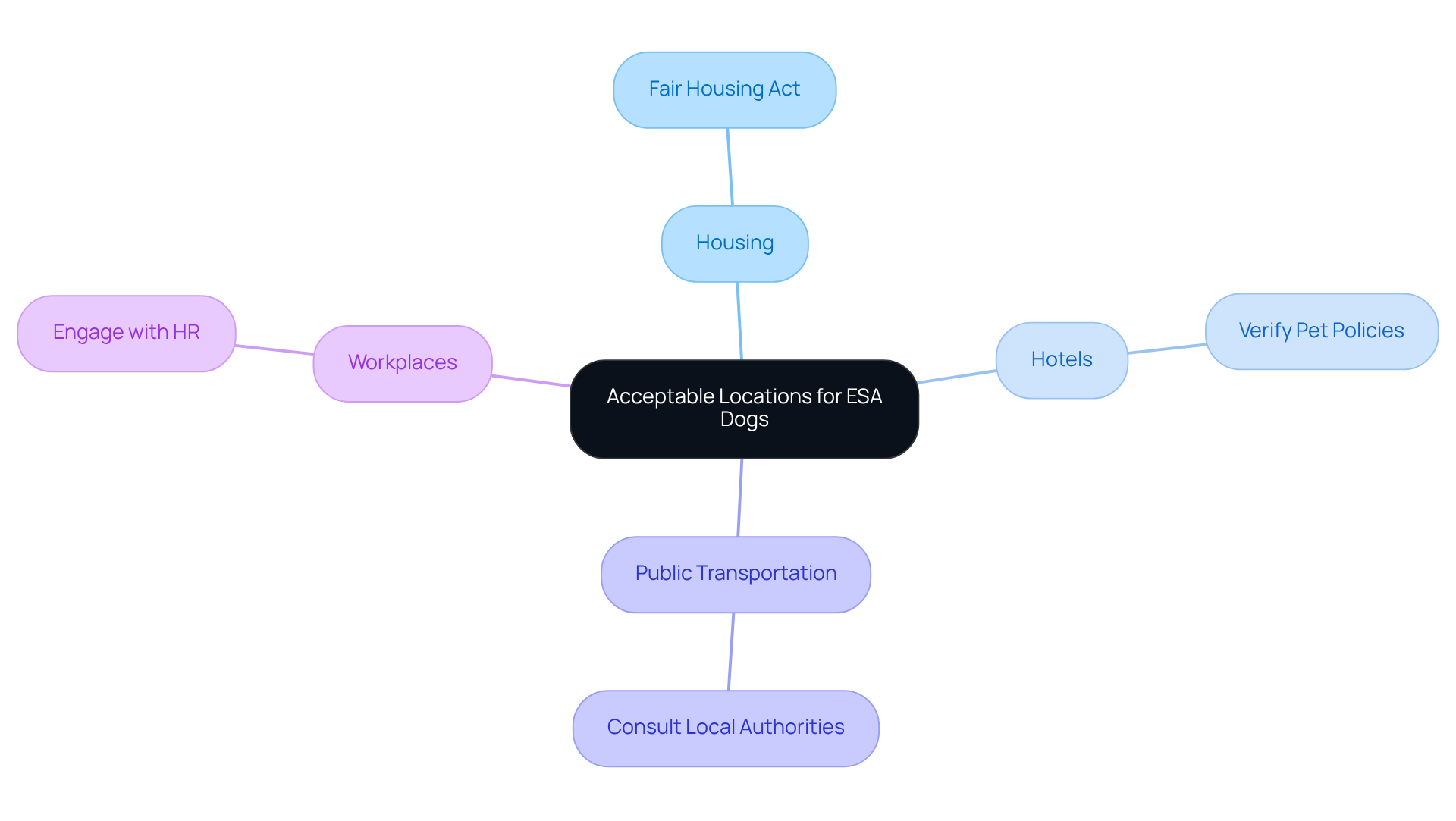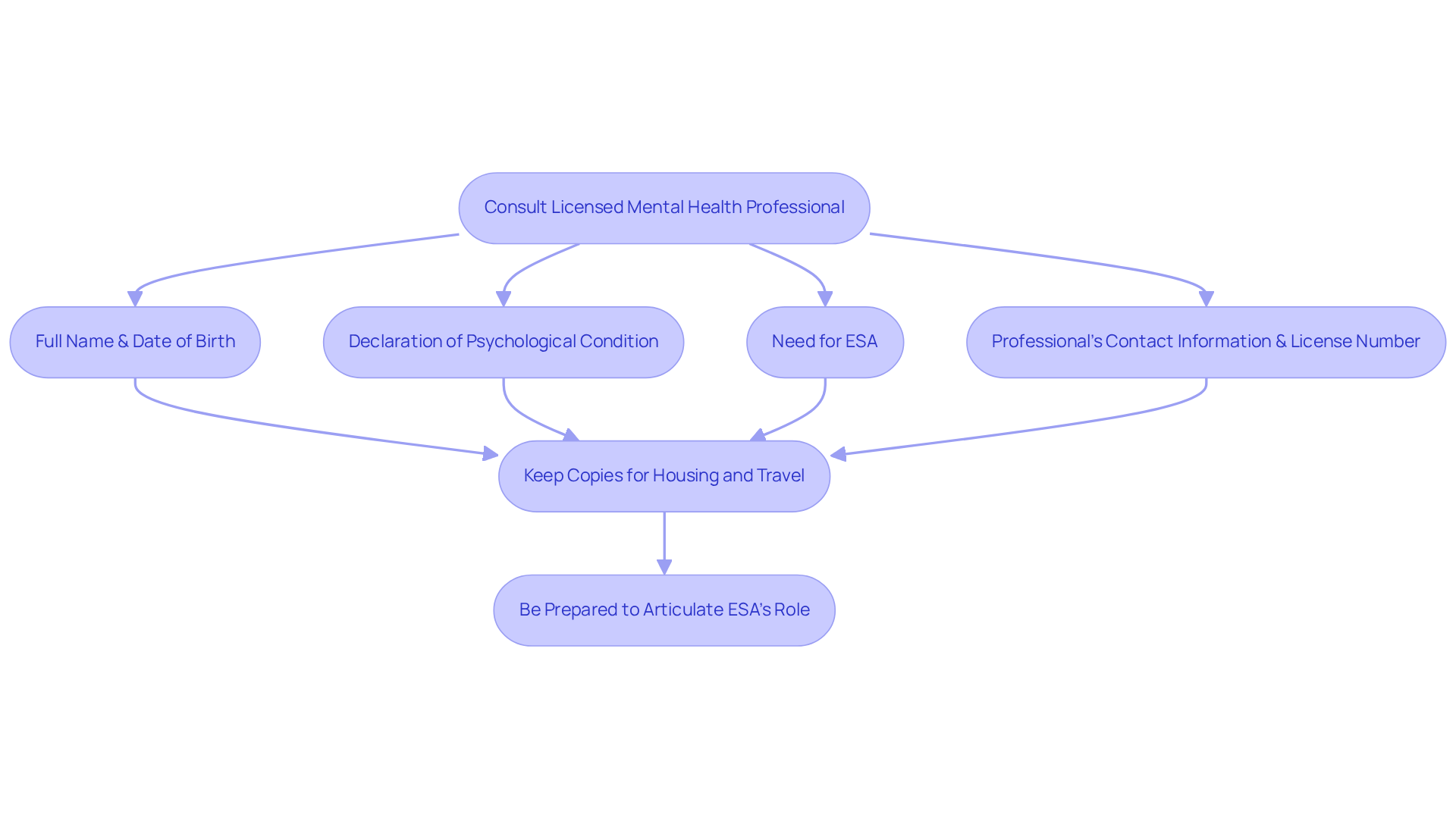

7 Essential Tips on Where Can I Take My ESA Dog
by Lena Park
Last updated: July 9, 2025
Verified and Approved by:
Angela Morris,
MSW, LCSW
Fact Checked

Overview
This article highlights the important places where individuals can take their Emotional Support Animal (ESA) dog, shedding light on the legal rights and accommodations that are available to ESA owners. It acknowledges the emotional challenges that many face, such as anxiety or depression, and reassures them that while ESAs are allowed in private housing under the Fair Housing Act, they do not possess the same public access rights as service animals. Therefore, it is essential for ESA owners to verify specific policies regarding travel, housing, and workplaces to ensure a smooth and supportive experience.
Introduction
Navigating the world with an Emotional Support Animal (ESA) can be a source of comfort, yet it often comes with its own set of challenges. As the recognition of ESAs continues to grow, so too does the need for clarity regarding where these beloved companions are permitted. This article aims to provide essential tips for ESA owners, shedding light on:
- Legal rights
- Acceptable locations
- Necessary documentation to facilitate a smoother experience
However, with numerous restrictions and varying policies in place, how can one effectively advocate for their ESA’s access to:
- Housing
- Travel
- Public spaces
It’s crucial to understand these complexities, as they can significantly impact your emotional well-being.
Define Your Emotional Support Animal (ESA)
An Emotional Support Animal (ESA) is any animal that offers comfort and emotional support to individuals facing mental health challenges. Unlike service animals, which are trained to perform specific tasks for those with disabilities, emotional support animals do not require specialized training. They primarily provide companionship, alleviating feelings of anxiety, depression, and loneliness.
Many individuals struggle with emotional challenges, feeling isolated and overwhelmed. Typical emotional support animals include dogs and cats, but smaller creatures like rabbits and birds can also fulfill this nurturing role. Research indicates that about 50% of individuals with psychological conditions report that ESAs significantly enhance their daily functioning, underscoring their therapeutic benefits.
To ensure the legitimacy of an ESA, it is vital that the animal is acknowledged by a licensed therapist, as it affects where can I take my esa dog. This validation not only strengthens the animal’s role in supporting an individual’s well-being but also facilitates access to housing and travel arrangements under laws such as the Fair Housing Act and the Air Carrier Access Act.
At Wellness Wag, we understand the importance of emotional support and offer an affordable and efficient process for obtaining your ESA letter. With interest-free payment plans starting as low as $32.25, we make it accessible for you. By consulting a licensed medical professional through Wellness Wag, you can receive expert guidance and care, including information on where can I take my esa dog to ensure that your ESA is properly registered. Our Money-Back Guarantee and numerous Client Testimonials highlight a seamless ESA approval process. We are committed to HIPAA compliance, prioritizing client privacy, making the process not only efficient but also secure.
As understanding of the advantages of emotional support animals continues to grow, so does the acknowledgment of their significance in aiding mental health. In recent years, we have observed a notable rise in registrations for these animals. You are not alone in this journey; support is available, and we are here to help you every step of the way.
Understand Your Legal Rights as an ESA Owner
Familiarize yourself with the Fair Housing Act (FHA), a vital law designed to protect those with emotional support animals (ESAs) in housing situations, particularly inquiring about where can I take my ESA dog when pets are often restricted. This federal law safeguards ESA owners from discrimination based on their disabilities, allowing them to live harmoniously with their beloved animals, even in no-pet housing.
It’s important to recognize that emotional support animals do not enjoy the same public access rights as service animals. Unlike service dogs, which are specifically trained to assist individuals with disabilities, ESAs primarily offer emotional support. This means they are generally not permitted in public spaces such as restaurants, stores, or other establishments, which can be a source of frustration for many.
You have the right to request reasonable accommodations in both housing and travel situations, including inquiries about where can I take my ESA dog. If you have a valid ESA letter from a licensed therapist, you can ask your landlord to reconsider their pet policies, which raises the question of where can I take my ESA dog. This letter serves as a crucial tool in advocating for your needs.
Keeping your ESA documentation readily available is essential. This includes your ESA letter, which should detail your mental health condition and the necessity of your animal for emotional support. Having this documentation on hand can ease interactions with landlords and travel providers, fostering understanding and cooperation.
Stay informed about the latest updates regarding ESA rights under the FHA. Recent statistics indicate that 60% of complaints filed with HUD relate to disability access and reasonable accommodation denials. This highlights the importance of understanding your rights and effectively advocating for them, ensuring your voice is heard.
Be aware that many states require ESA letters to be renewed after 12 months, which is crucial for maintaining your rights as an ESA owner. For instance, states like California, Louisiana, and Iowa mandate a 30-day relationship with a healthcare provider before an ESA letter can be issued. This requirement is essential for compliance with local laws and for your peace of mind.
Consulting expert opinions on the Fair Housing Act and emotional support animals can provide valuable insights. Legal experts emphasize that understanding your rights as an ESA owner is crucial for navigating potential challenges and ensuring compliance with housing regulations, helping you feel more empowered.
Consider the successful examples of ESA accommodations under the FHA. Numerous tenants have effectively reached agreements with landlords to permit their emotional support animals in previously restricted housing. These stories demonstrate the effectiveness of clear communication and proper documentation, reminding you that support is available and achievable.

Identify Acceptable Locations for Your ESA Dog
- Under the Fair Housing Act, emotional support animals are permitted in private homes, including rental properties, even when landlords have strict no-pets rules. This legal protection is crucial for individuals facing mental health challenges, allowing them to live with their beloved emotional support animals, which can provide comfort and companionship.
- While many hotels and motels may welcome emotional support animals, it’s important to verify their specific pet policies in advance to understand where can I take my esa dog. Some establishments might have restrictions or require additional documentation. By reaching out to them directly before booking, you can ensure a smoother experience and avoid any unexpected surprises.
- Policies regarding emotional support animals on public transportation can vary significantly. It’s essential to consult local transit authorities to understand their specific regulations. This knowledge will help you determine whether emotional support animals are allowed on buses, trains, or other forms of public transport, ensuring you can travel with your support animal comfortably.
- Some workplaces may also permit emotional support animals as part of their reasonable accommodation policies. If you’re considering bringing your emotional support animal to work, it’s advisable to engage with your HR department. Discussing this possibility can help you understand the company’s stance and find a supportive solution that works for everyone.
- Recent statistics reveal that around 18% of pet owners in the U.S. have emotional support animals, highlighting a growing recognition of their mental health benefits. This trend is also reflected in the hospitality industry, where more hotels are adapting their policies to embrace emotional support animals, creating a more welcoming environment for those in need.
- As we look ahead to 2025, public transportation systems are increasingly acknowledging the significance of emotional support animals, with many updating their policies to allow for greater access. Staying informed about these changes will help ensure a smooth journey with your emotional support animal, allowing you to travel with peace of mind.
- To determine where can I take my esa dog, it’s recommended to check hotel and motel pet policies by visiting their official websites or calling their customer service lines. This proactive approach not only helps avoid surprises upon arrival but also ensures compliance with their specific requirements, allowing you to focus on your well-being and the support your emotional support animal provides.

Prepare Required Documentation for ESA Access
To obtain a valid ESA letter, it’s important to consult a licensed mental health professional who can provide the necessary documentation. This letter should include your full name and date of birth, a clear declaration verifying your psychological condition, and the need for the ESA for your emotional welfare. Additionally, it should contain the professional’s contact information and license number, ensuring the letter’s legitimacy.
Emotional Support Animals play a crucial role in alleviating symptoms associated with psychological conditions, offering comfort and assistance to individuals with disabilities. Keeping copies of your ESA letter readily available for housing applications and travel purposes is essential. This documentation serves as a vital tool in advocating for your rights under the Fair Housing Act and Air Carrier Access Act, allowing you to fully enjoy residential life with your ESA.
If questioned by landlords or service providers, be prepared to articulate your ESA’s role. Understanding the significance of your ESA can help clarify its importance in your emotional well-being journey. Statistics reveal that 62% of ESA owners reported enhanced well-being during the pandemic, underscoring the essential role these animals play in providing emotional support.
Key elements of a valid ESA letter include the mental health professional’s assessment of your condition, the specific benefits the ESA provides, and the professional’s license number and contact information.
Instances of impactful ESA letters can greatly influence housing requests, illustrating the importance of the animal in managing your emotional well-being. Typically, prerequisites for ESA letters from licensed experts involve a thorough assessment of your psychological background and a clear recommendation for the ESA’s function in your treatment strategy. This ensures that the letter meets legal standards and effectively supports your needs, facilitating access to housing and enhancing the overall quality of life for individuals facing mental health challenges.

Conclusion
Navigating life with an Emotional Support Animal (ESA) can be both rewarding and challenging, especially when it comes to understanding where these vital companions are allowed. Knowing your rights, acceptable locations for your ESA, and the necessary documentation is crucial. This knowledge empowers ESA owners to advocate effectively for their needs, ensuring that their emotional well-being is nurtured in various environments.
Throughout this article, we’ve highlighted key insights, including the legal protections under the Fair Housing Act, the importance of verifying pet policies at hotels and public transportation, and the necessity of obtaining a valid ESA letter from a licensed mental health professional. These elements are essential for ensuring that ESA owners can enjoy the companionship of their animals in housing and travel situations, while also navigating the complexities of public access rights.
As society continues to recognize the profound impact of emotional support animals on mental health, it is vital for ESA owners to stay informed about their rights and the evolving landscape of ESA access. By taking proactive steps—such as preparing the necessary documentation and understanding the policies of various locations—owners can create a supportive environment for themselves and their ESAs. Embracing this journey not only enhances individual well-being but also contributes to a broader understanding of the significance of emotional support animals in our lives.
Frequently Asked Questions
What is an Emotional Support Animal (ESA)?
An Emotional Support Animal (ESA) is any animal that provides comfort and emotional support to individuals facing mental health challenges. Unlike service animals, ESAs do not require specialized training and primarily offer companionship to alleviate feelings of anxiety, depression, and loneliness.
What types of animals can be considered ESAs?
Typical emotional support animals include dogs and cats, but smaller animals like rabbits and birds can also fulfill this nurturing role.
How do ESAs benefit individuals with psychological conditions?
Research indicates that about 50% of individuals with psychological conditions report that ESAs significantly enhance their daily functioning, highlighting their therapeutic benefits.
How can I ensure my ESA is legitimate?
To ensure the legitimacy of an ESA, it is essential that the animal is acknowledged by a licensed therapist. This validation strengthens the animal’s role in supporting an individual’s well-being and facilitates access to housing and travel arrangements under laws like the Fair Housing Act and the Air Carrier Access Act.
How can I obtain an ESA letter?
Wellness Wag offers an affordable and efficient process for obtaining your ESA letter, with interest-free payment plans starting as low as $32.25. Consulting a licensed medical professional through Wellness Wag provides expert guidance and care.
What guarantees does Wellness Wag provide for the ESA approval process?
Wellness Wag offers a Money-Back Guarantee and highlights numerous Client Testimonials, ensuring a seamless ESA approval process while prioritizing HIPAA compliance and client privacy.
Is there a growing acknowledgment of the importance of ESAs in mental health?
Yes, as understanding of the advantages of emotional support animals continues to grow, there has been a notable rise in registrations for these animals, underscoring their significance in aiding mental health.
Certify Your Emotional Support Animal Today

Why You Can Rely on Us?
At Wellness Wag, we believe your pet deserves care rooted in both science and compassion. Each article is carefully researched, written in clear language for pet owners, and then reviewed by qualified professionals to ensure the information is evidence-based, current, and practical for real-life care. Our goal is to help you feel confident in making informed decisions about your pet’s health and well-being.
Reviewed by
Angela Morris, MSW, LCSW
Angela is a licensed clinical social worker with 20 years of experience in patient advocacy and community mental health. She has assisted numerous clients with ESA evaluations and brings a deep understanding of disability accommodations, ensuring that all information is accurate, supportive, and practical.

Written by :
Lena Park
Last Updated :
July 9, 2025












